Test management is integral to the software development process. It entails managing everyday testing activities, from creating test cases to executing them and capturing results. To facilitate this process, test management tools come in handy. They help testers or a quality assurance (QA) team manage the following:
- Creating and executing test cases.
- Storing the results of executed tests.
- Generating test results report.
- Tracking defects alongside test execution.
- Importing/exporting tests from Excel to test management tools.
Choosing the right test management tool is essential to maximize the efficiency of the testing process and reduce the number of bugs and errors that the QA team would have left unnoticed.
With a plethora of tools available on the market, it becomes overwhelming to pick the best one. In this article, we have curated a list of the handpicked test management tools that streamline the end-to-end testing process.
What is Test Management?
It is the process of managing and monitoring the testing activities to ensure high-quality and end-to-end testing of software applications. It entails organizing, controlling, and ensuring the traceability and visibility of the software testing process to deliver high-quality software products.
The primary aim of test management is to split the testing process into smaller and more manageable tasks and helps the testing team to know the following:
- What types of tests to run?
- When to run tests?
- How to run each test?
- How to compare the test results against the performance and functionality expectations of the software application?
The test management process is inevitable to ensure that a software product under development is free from bugs and errors, complies with quality standards, and meets customer requirements. Also, it helps organizations meet their deadlines faster, streamline project resource allocation, and improve team collaboration.
Need for Test Management Tools
1. Minimize Data Duplication
When testing and development teams work in silos, there is a high risk of data duplication. This makes it difficult for the testing team to make informed decisions with duplicate data spread across multiple locations.
Test management tools minimize data duplication by consolidating everything in a central place. It gives everyone – a test manager, development team, and testing team – a big picture of the testing process. Also, it helps the QA team to monitor all testing activities, track results, and create detailed reports.
2. Assist in Regulatory Compliance
Many organizations have the criteria of specifying all the details in documents associated with tests. Test management tools automatically record every test-related detail, such as test running time, test requirements covered, etc. This helps organizations manage testing activities systematically and avoid chaos.
3. Easy Consolidation
Test management tools consolidate every aspect of tests, such as test cases, plans, defects, requirements, etc. In addition, they simply defect tracking and defect management. This helps the testing and development teams clearly understand every testing activity.
4. Eliminates the Barrier Between Development and Testing Teams
The development and testing teams now don’t have to face communication challenges via chats or emails. Test management tools allow easy communication and collaboration with the commenting feature. Also, they help managers keep track of each phase of the software testing life cycle ( STLC ).
How to Choose the Best Test Management Tool?
Here are a few essential features to look for while choosing a test management tool:
- User Interface: It should have a clean and intuitive user interface, making it easy for beginners to navigate the tool.
- Usability: It refers to the ease with which you can learn using the tool’s features. Also, it includes a level of tech support, user support, training, and documentation the tool provides.
- Test Planning: Choose the tool that simplifies for the QA team to create and record the test plan, test cases, and test runs. Also, it should help them plan test designs and create test suites.
- Requirement Management: The tool should enable the development team to define and track requirements throughout testing.
- Test Execution: The tool should support different types of testing , such as automated and manual testing, integration testing, continuous testing, system testing, etc.
- Reporting and Analytics: It should help the QA team create detailed reports on the test case execution results and the progress throughout testing.
-
Integrations:
The tool should be able to seamlessly integrate with the third-party tools, software, or add-ons useful in the
software development process
. These tools or software may include:
- Bug-tracking tools
- Project management tools
- Issue-tracking tools
- CI/CD tools
- Automated testing tools
- Application life cycle management (ALM) tools
- Adaptation to Different Development Processes: The tool should adapt to different development processes, such as Agile , DevOps, Waterfall, etc.
- Support Multiple Users: It should be possible for multiple users to use the tool and access any test cases simultaneously.
- Pricing: Choose the tool that fits your budget and provides all essential features and functionality.
10 Best Test Management Tools to Use in 2023
1. PractiTest
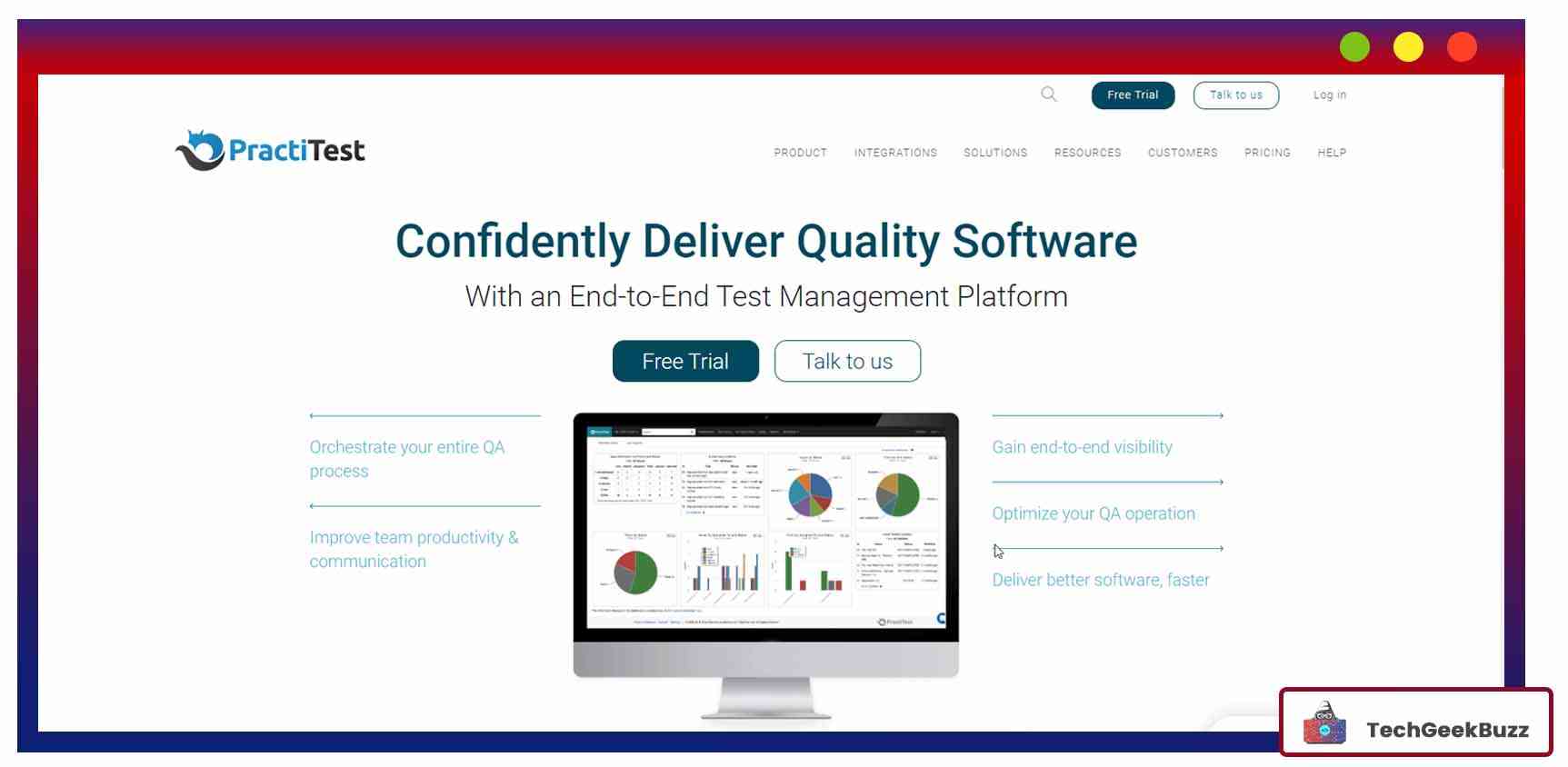
It is an end-to-end SaaS test management platform that helps organizations confidently deliver top-notch software solutions. You can bring all your QA processes, work, teams, and tools to a central place with PractiTest.
The tool lets organizations manage manual, exploratory, and automated tests in a shared space and help them make data-driven decisions. Interactive dashboards and reports provide a detailed overview of the QA process. You can even customize dashboards and reports to extract the desired and relevant data.
Features
- Manages all QA artifacts – requirements, tests, test runs, test sets, and issues – in one place.
- Integrates with any automation tools using PractiTest’s internal framework – xBot or using REST API.
- Provides a Test Library to import, create, manage, and optimize tests.
- Test Parameters , Test Set Permutations , and Call-to-Test help you eliminate repetitive tasks.
- The Task Board helps you manage all test artifacts.
- Test Value Score is an AI-powered feature that automatically assigns scores to each test based on its contribution, allowing test managers to optimize the testing operation.
- Works best with Agile, Waterfall, and Devops methodologies.
- The SOC Type 2 and ISO 27001 compliance ensure your data's reliability and security.
Pricing
Offers a 14-day free trial.
- Professional: $39/user/month
- Enterprise: $49/user/month
- Ultimate: Contact sales
Sign up here .
2. Tuskr
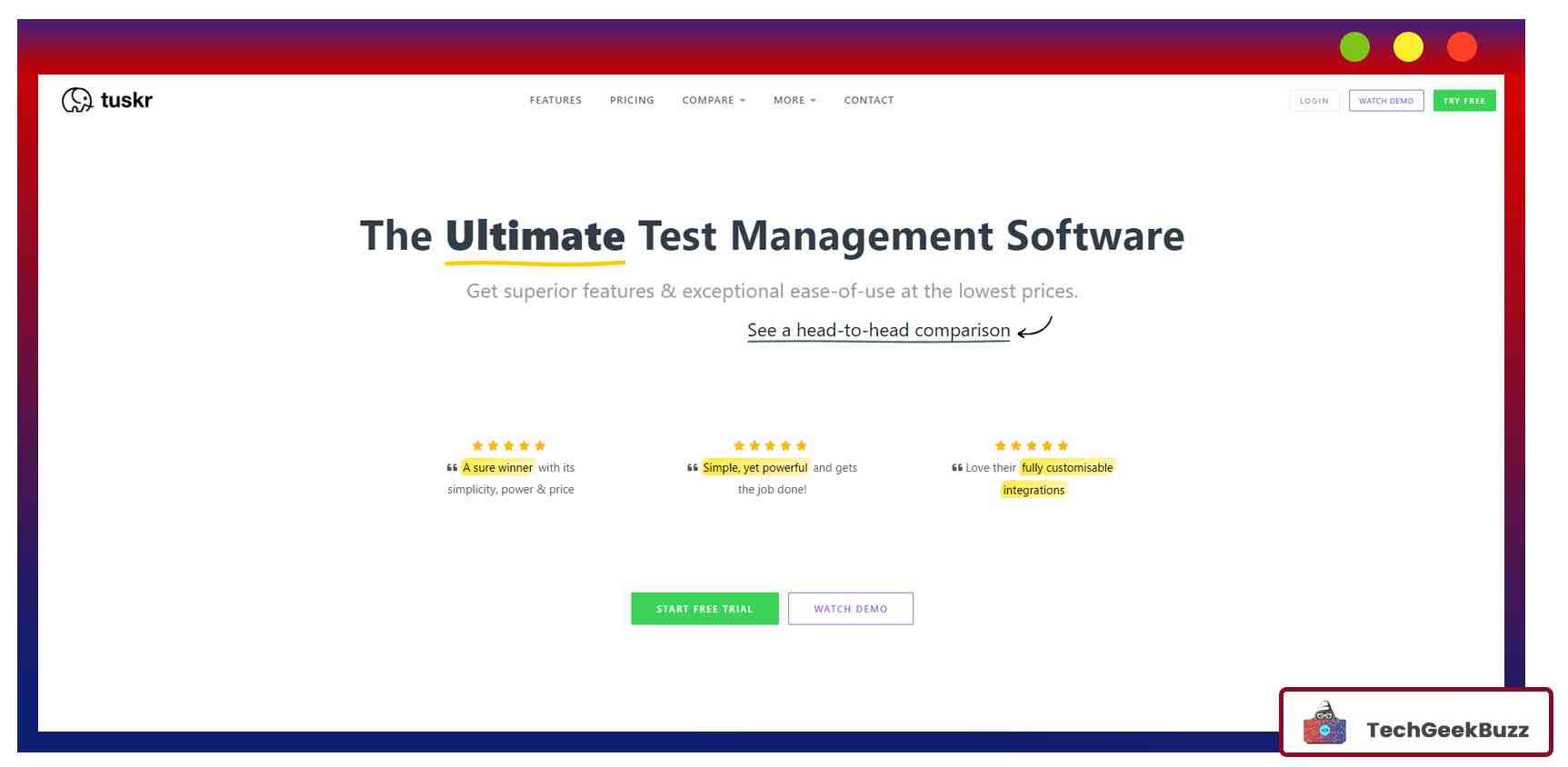
It is a unified, cloud-based test management tool with an easy-to-use and simple interface. Packed with all the essential and superior features required to manage all QA operations, Tuskr is ideal for product managers, QA testers, development teams, and IT specialists.
The tool provides a WYSIWYG editor to write test cases that supports rich-text formatting. It allows you to create test runs that include all test cases in a project or specific ones. Moreover, the tool improves teamwork by fostering transparency while ensuring improved efficiency.
Features
- Organize the test data with HTML tables.
- Copy-paste images from a clipboard or file.
- Import test cases into spreadsheets, including custom fields.
- Edit test cases in bulk.
- Get expected results for each test case.
- Supports the bulk mode while adding test execution results or reassigning test cases.
- Lock test runs to preserve integrity.
- Share test execution reports in a PDF format with others.
- The workload chart identifies over and under-utilized testers.
- Dashboards help you track the progress of each test run.
- Restore an accidentally deleted project, test run, or test suite.
- Audit logs help you determine what was changed, who has changed, and when it was changed.
- Seamlessly integrates with time tracking, issue tracking, and messaging applications.
Pricing
- Free: Free forever
- Team: $9/user/month
- Business: $12/user/month
Sign up here .
3. TestRail
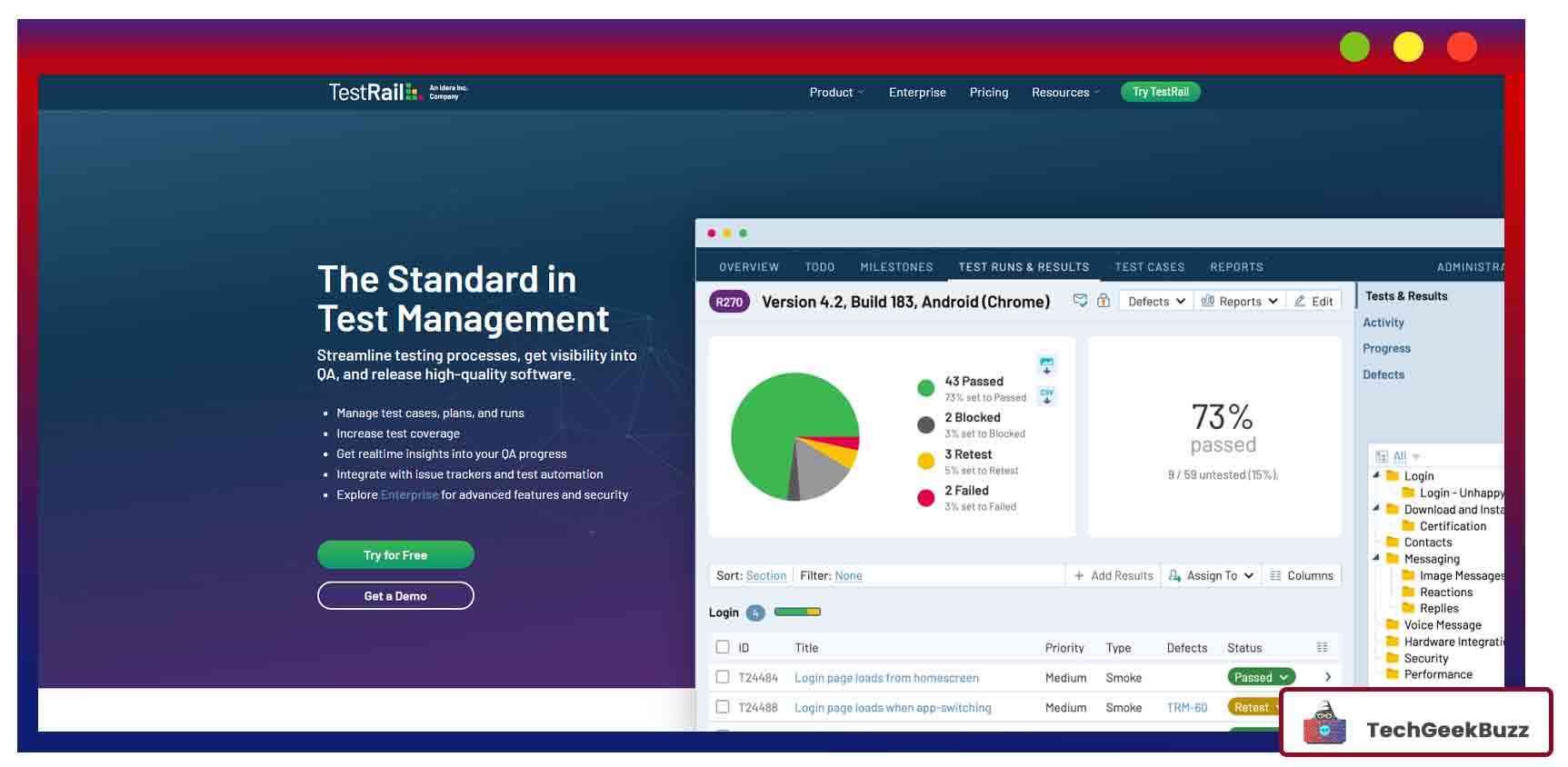
Ideal for QA and development teams, TestRail helps them create and manage test cases, execute them, track their progress, and record the results for both automated and manual testing. It supports both Agile and Waterfall methodologies .
The tool provides complete visibility into QA operations, streamlines various testing processes, improves test coverage, and helps organizations release high-quality software. An easy-to-use interface makes it easy to organize and structure reusable test cases in folders and track test execution progress.
TestRail gained the highest ratings for its best results in the annual 2021 G2 Grid for Test Management and Software Testing and became a leader.
Features
- You can host TestRail on your own servers or use the SaaS solution for a fast and easy setup.
- The tool is a perfect choice for a team of any size, any workflow – agile or waterfall, and any method – automated, exploratory, and functional.
- A unique three-pane view enables users to be more productive.
- The tool has a powerful interface enabling multiple project teams to work simultaneously and track progress.
- Easy organization of test suites, sections, and cases.
- You can quickly draft test cases, evaluate their coverage, and link them to requirements and defects in Atlassian JIRA, GitLab, etc.
- Generate traceability reports easily, allowing every team member to gain insights into the testing process.
Pricing
Offers a 14-day free trial.
- Professional Cloud: $34/user/month
- Enterprise Cloud: $69/user/month
Sign up here .
4. Xray

It is a native test management platform for JIRA , a leading issue and project tracking software. By combining test management at every stage of software development, Xray helps organizations release stellar software applications.
The tool bridges the silo between the development and testing teams. It allows them to gain insights into each other’s processes and use the same terminology and naming conventions. This effective team collaboration ensures the running of tests at a faster pace.
Features
- You can ensure the maximum test coverage, identify errors quickly, and release first-in-class software applications.
- The traceability reports help you know which tests went right and which went wrong.
- The smart orchestration feature and integration with Cucumber and JUnit make it easy to manage testing across large codebases.
- Test your web, desktop, and mobile apps right from your desktop to discover hidden bugs.
- Seamlessly integrates with agile processes.
- Supports native behavior-driven development (BDD).
Pricing
Contact sales for a quote.
Sign up here .
5. Kualitee
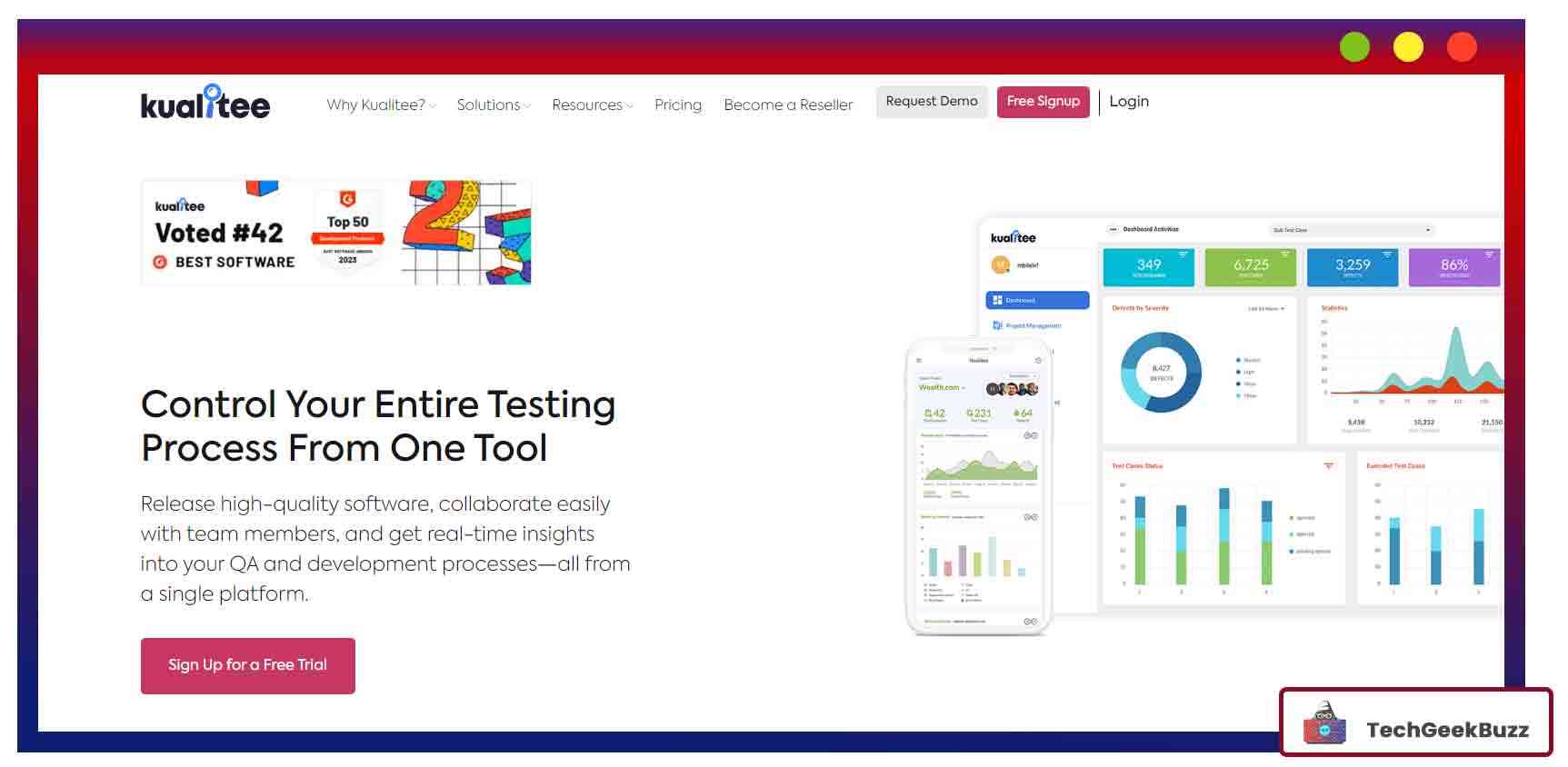
The tool is a one-stop solution for all your testing needs. It makes your testing process systematic, simple, and refreshing, from planning to execution and tracking results. It is well-known as the best Test Planning Software in the market.
Kualitee simplifies the management of test data, suites, and scripts and supports executing automated and manual tests. This real-time test management tool lightens the load of writing test cases and makes it easy to track them, eliminating the chance of repeatedly testing a single test case.
Furthermore, the tool's easy-to-use dashboards, testing progress, status, trends, and marking defect severity are a few primary utilities.
Features
- Use test scenarios and test cases to create test plans.
- The bulk edit feature allows you to edit multiple test cases simultaneously and execute them accurately and quickly.
- The tool lets you record every change through a detailed history of activities.
- Associates test cases to builds, models, and requirements.
- Link requirements, test cases, and defects to make backward and forward traceability easy.
- View test case coverage, defects, and execution speed in a single place.
- Supports reusing test cases to save time significantly.
- Seamlessly integrates with a plethora of other testing tools.
Pricing
Offers a 7-day free trial.
- Cloud: $15/month for 1 user.
- Onn-Premises: $2920/year for 10 users + $2000 one-time installation charges
Sign up here .
6. TestCollab
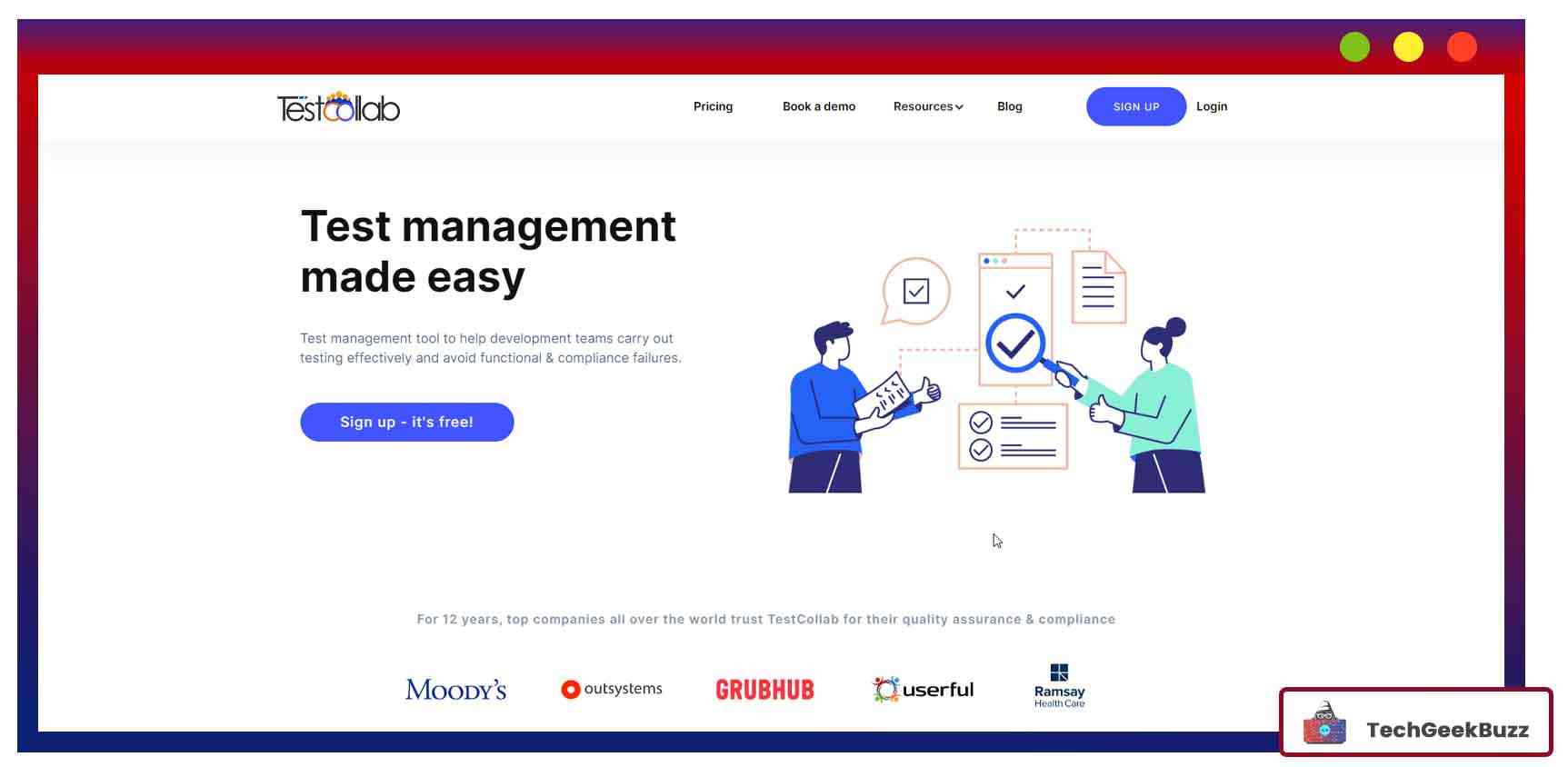
The tool makes test management easy and helps testing teams conduct software testing effectively by preventing functional and compliance failures. This user-friendly tool supports both automated and manual testing.
TestCollab provides a centralized test repository to bring test cases, test plans, and requirements into a centralized, shared space. This eliminates the need for searching for data in messy spreadsheets and folders.
As a team leader, you can create test cases and assign them to a group of testers for execution. The automatic work assignment feature helps you do so and save time, allowing you to focus more on other essential tasks. Furthermore, you can create custom fields and tags to customize the workflow according to your project.
Features
- Keep an eye on your team’s workload and progress.
- Real-time charts and other visuals help teams share their work status and spot potential errors.
- Automatic time tracking and smart prediction features enable you to predict the time required to execute each test case.
- Gain insights into your team’s resources and determine who has the bandwidth to take on more work and who has the maximum load.
- Seamless integration with JIRA helps you create JIRA issues, test plans, and test cases and map JIRA stories as TestCollab requirements.
- The commenting feature reduces the headache of switching between tabs to communicate with team members. Simply flag your team member with @mention .
- Support reusing the tests across multiple projects.
Pricing
- Free: Free forever
- Premium: $29/user/month
- Enterprise: Contact sales
Sign up here .
7. Zephyr Scale
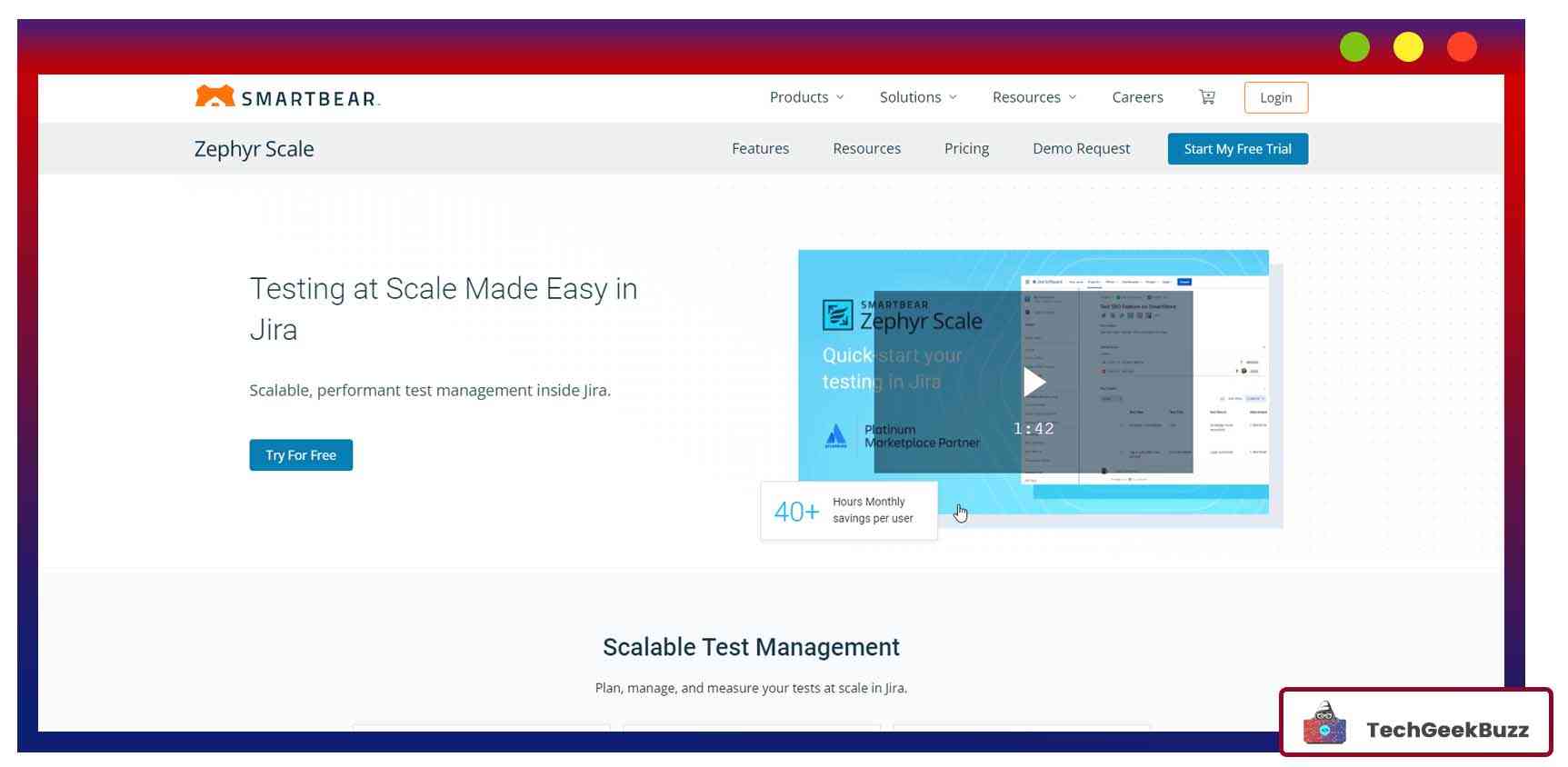
It is a perfect test management solution for a team of any size. It natively integrates with JIRA. Hence, you can easily plan, manage, and measure your tests at scale in JIRA. Also, you can streamline all test management activities, such as test planning, test case creation, specification, execution, tracking, and reporting, right within JIRA.
Further, test modularization helps testing teams reduce data redundancy and duplication during the test design phase. The tool offers all team members visibility across the test management life cycle right from JIRA.
Zephyr Scale helps you easily manage your testing efforts by focusing more on test coverage and execution.
Features
- Hierarchical folders make managing and accessing all your test assets from a central hub easy.
- You can reuse test cases across all other JIRA projects.
- Track the detailed history of data changes to gain better insights.
- Test data and parameters improve test reusability, and shared steps between test cases eliminate data redundancy.
- Import all test cases and the associated data via .csv or REST API into Zephyr Scale.
- You can integrate Zephyr Scale with other open-source testing tools with the free REST API.
- Integrate with CI/CD tools like Jenkins , Bamboo, etc.
Pricing
- Cloud: $10/month for 10 users
- Data Center: $3,210/year for 50 users
- Server: $214/purchase price for 10 users
Sign up here .
8. Spiratest by Inflectra
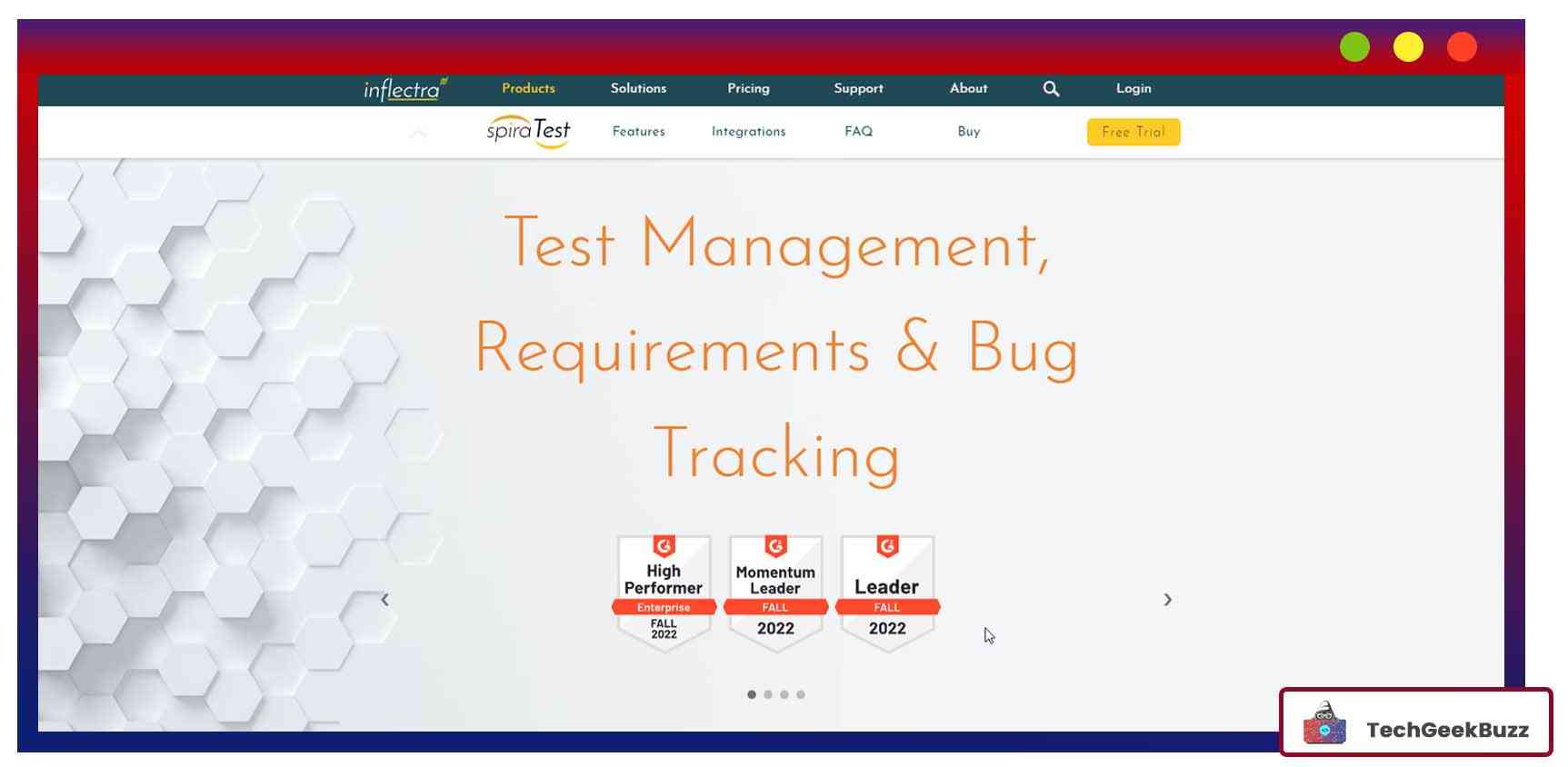
It is a test management, requirements, and bug-tracking tool. It is a complete quality assurance solution for managing tests, requirements, and bugs in one single place. Also, it provides clear visibility from start to end and real-time reports.
The tool supports creating and running automated and manual tests from a central hub. While running tests, it seamlessly identifies bugs and defects. It is ideal for a team of any size and supports as many tests, projects, items, and API calls as you want.
Features
- Supports test review and workflow management, test scheduling, test coverage for requirements, and data-driven testing with test configurations.
- The test execution wizard simplifies the execution of a group of test cases. Also, it helps you mark each step as pass or fail and record a defect or error.
- Supports managing automated and manual testing in the same environment.
- Makes plugins available for UFT, TestComplete, Ranorex, and Selenium.
- Has a dedicated exploratory testing mode.
- Provides a rich library of printable reports and graphical charts.
Pricing
Offers a 30-day free trial.
- Cloud: $36.30 per concurrent user per month
- Download: $392.00 per concurrent user + annual renewal: $1,175.99
Sign up here .
9. TestMonitor
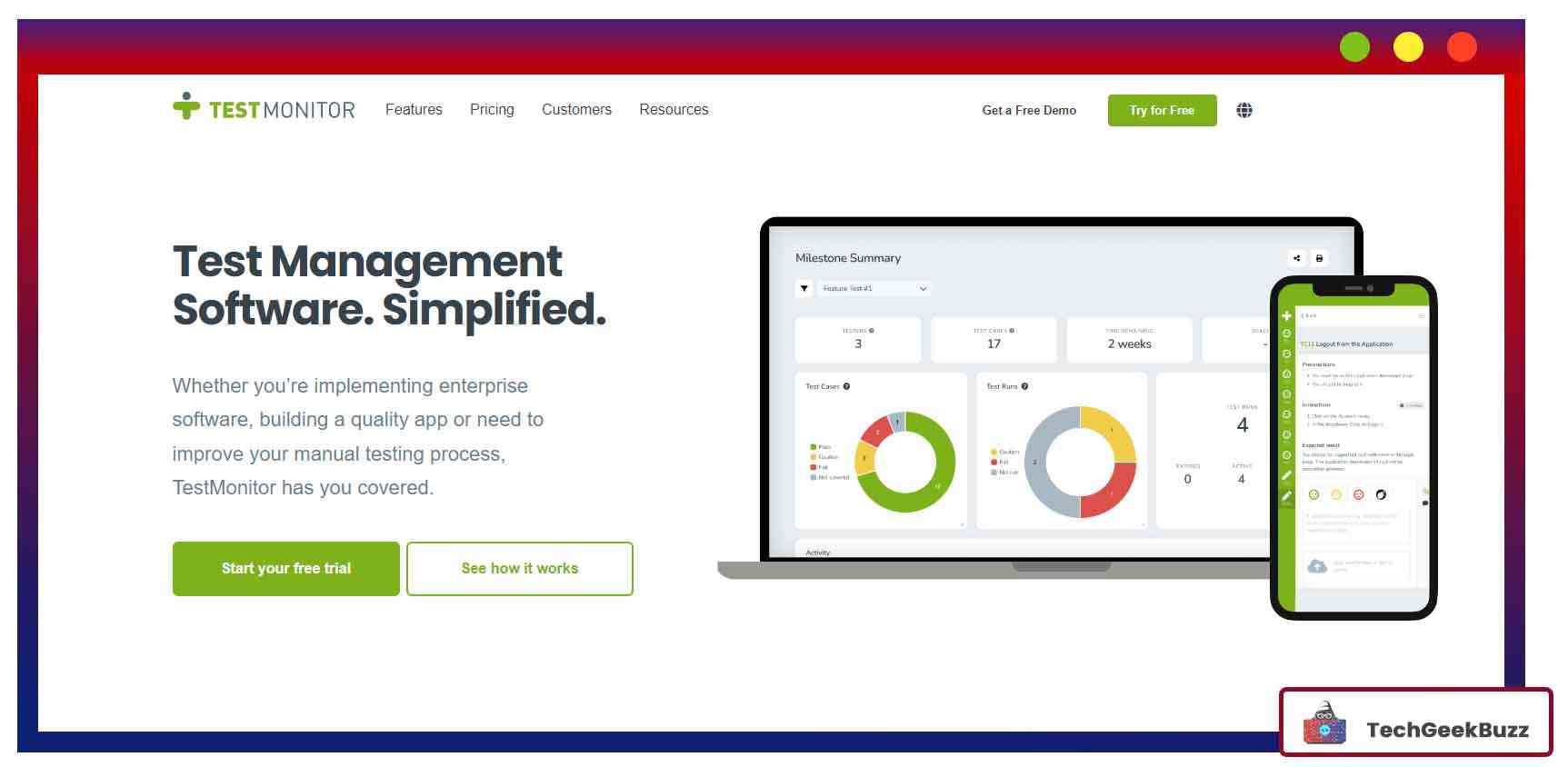
This test management solution is ideal for any need – building an enterprise software solution, developing a quality app, or improving your manual testing skills. It streamlines the entire testing process, from defining, designing, and creating tests and running test cases to tracking results, recording issues, and reporting.
TestMonitor provides intuitive tools that help you create test cases with best practices that follow industry standards. You can also specify clear conditions and expected results with test cases, ensuring testers have everything to validate requirements. These include attaching data sets, images, and other files.
Built-in tools help you group related test cases into a test suite. After that, you can use filters and the search field to find test cases and customize the column setting to create the desired test case views.
Features
- Easily convert software requirements into test cases with just a few clicks.
- Assign multiple requirements to one or more test cases to ensure maximum coverage.
- Easily organize and prioritize test case execution with filters.
- Visually represents the relation between requirements, test cases, and test results.
- The tool has an intuitive interface with a side-by-side design that helps testers easily capture test results and check the box for the corresponding test cases.
- Integrates with automated testing platforms.
- You get the required resources to store logs, errors, and screenshots while performing automated testing.
- Advanced test reporting tools provide insights into the quality assurance process and team progress.
- The cloud platform allows you to run tests anytime, anywhere.
Pricing
Offers a 14-day free trial.
Starts at $19/user/month if billed annually.
Sign up here .
10. Micro Focus Silk Central
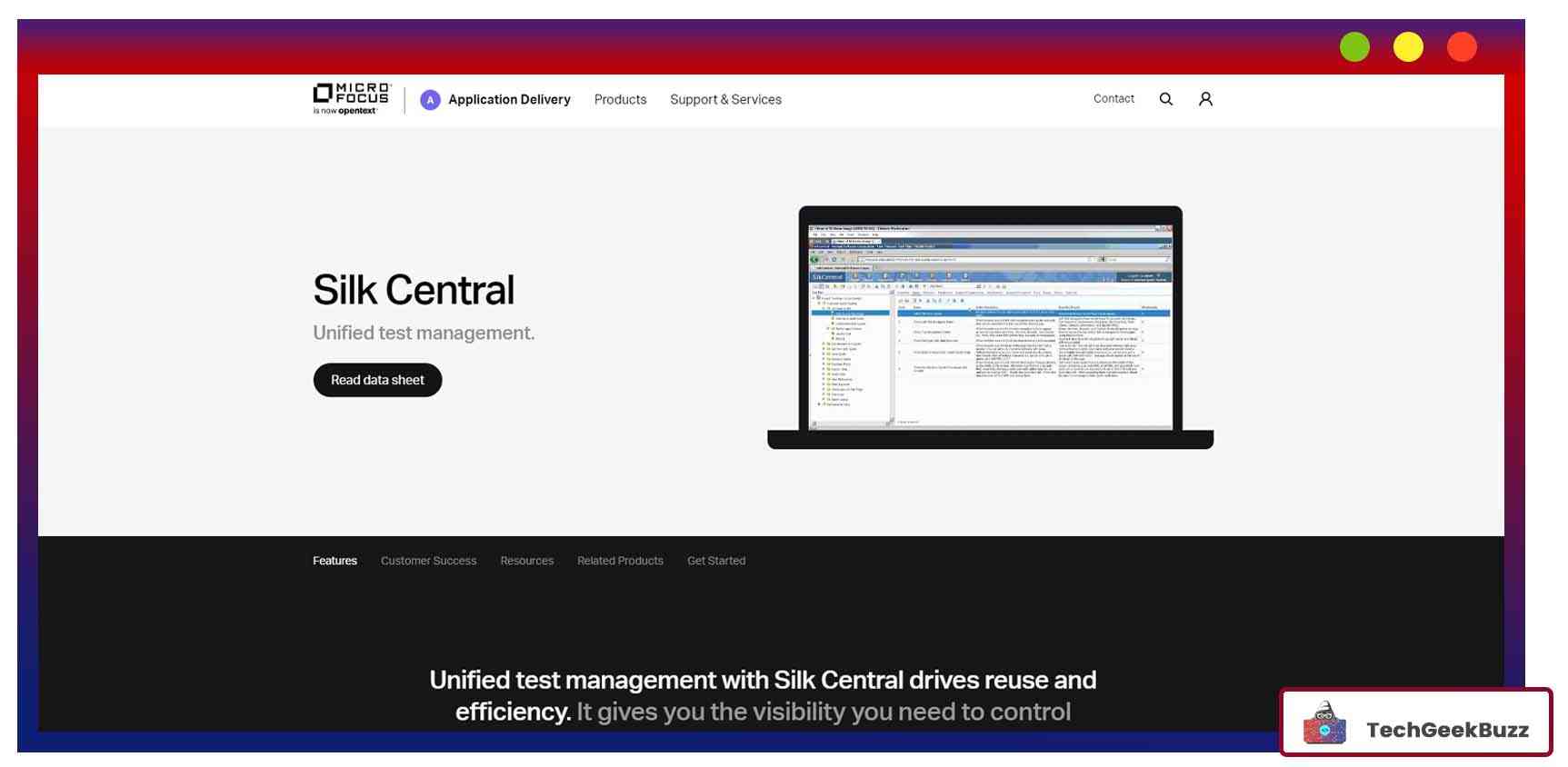
It is a unified test management platform that drives reusability and efficiency. It follows the keyword-driven software testing approach to reduce testing overload by achieving higher reusability. Also, the tool reduces the test execution time, curbs the test maintenance overhead, and drives efficiency.
Furthermore, Micro Focus Silk Central leverages requirements-driven and risk-based testing management approaches to gauge an application’s quality against the specified requirements. It manages automated and manual testing and ensures a seamless transition between them.
Features
- Convert manual tests into automated ones and vice-versa.
- Combine manual and automated tests in execution and reporting.
- The out-of-the-bix integrations with development and testing tools to build your own testing environment.
- A web-based user interface reduces maintenance costs.
Pricing
Sign up here .
Wrapping it Up!
Here ends our list of the best test management tools. These tools provide a central place to manage all testing activities or efforts, such as test planning, test case creation, test execution, defect tracking, and reporting.
Also, they automate manual testing efforts, such as test case creation, execution, and reporting, allowing QA teams to save time significantly. They provide clear visibility into the entire testing process and test results.
Though most of the above tools are not open-source and free, they are affordable. Select one that satisfies your team’s needs.
If you want to add any other tool to the list, feel free to comment below.
People are also reading:



![What is Waterfall Model? [Phases, Pros, & Cons]](/media/new_post_images/Waterfall_Model.webp)

Leave a Comment on this Post